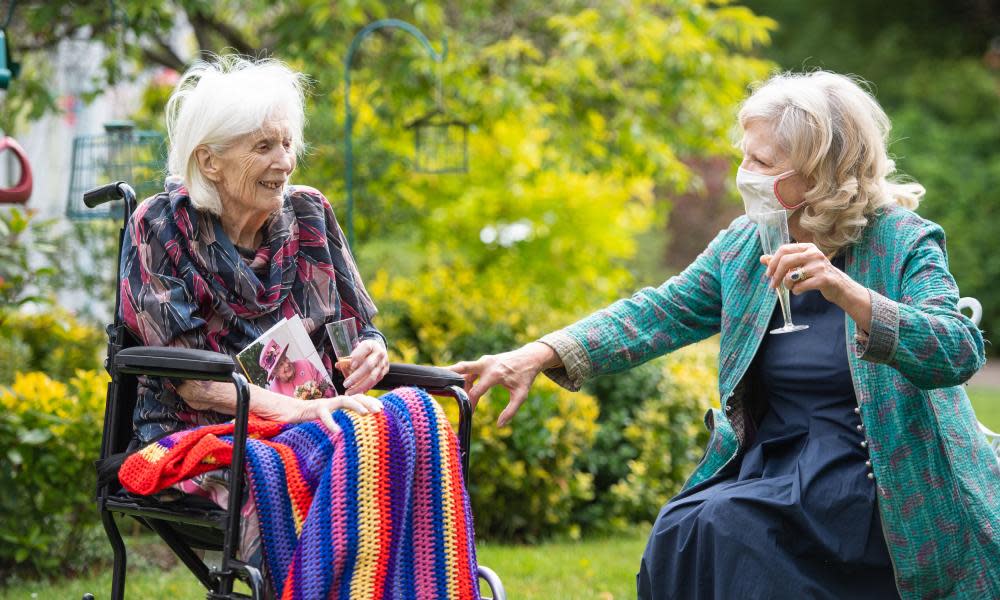Some English care homes to delay allowing hand-holding on visits

Some care homes are planning to defy government demands to let relatives hold their loved ones’ hands on indoor visits from Monday as they say the risk of transmitting Covid-19 remains too high.
Following pressure from relatives and charities including Age UK, the government has told care operators to make physical contact possible from the start of next week using testing and PPE. But some have warned relatives they will not allow it.
Some have said they must wait until local directors of public health say it is safe, and some have postponed in-person visits altogether. Others have said no visits will happen until all residents have had their second dose of vaccine, according to the Relatives and Residents Association (RRA) and the Rights for Residents campaign.
Diane Mayhew, a co-founder of Rights for Residents, said one supporter had been told visits would not happen because they were “at the manager’s discretion”.
Helen Wildbore, the RRA’s director, said: “Lot’s of people won’t have had a meaningful visit since the first lockdown, and many families have stopped window visits because they are too distressing. In the last 24 hours we heard of one relative who has been told by their loved one’s care home that visits won’t go ahead until they have seen the guidance. They have been through a lot already so this is incredibly disappointing.”
Relatives’ groups had lobbied for an urgent restart to in-person visits to care homes allowing physical contact, with some families separated for months and reports of severe deterioration of isolated residents.
Guidance for the visits issued on Thursday states “there should not be close physical contact such as hugging” but says “risks [of transmission] can be managed and mitigated, and they should be balanced against the importance of visiting and the benefits it brings to care home residents and their families”. It says all care homes where there is no outbreak should seek to enable indoor visits.
This week relatives of residents at Pelham House, a care home in Folkestone, Kent, that lost half of its 20 residents to Covid in the first wave, were told visits would not go ahead.
The home said in a letter: “We feel that we need to postpone these visits until such a time that we feel they can be conducted in a way that poses the least possible risk to all our residents, staff and their families.”
The move disappointed some relatives. Suzanne Amos said she had not seen her mother for three months, and as her mother has a terminal illness caused by dementia she wanted to see her while her mother still recognised her.
“It’s exactly at this time that mum still recognises me that I want to make the most of the fact and go and visit,” she said. “For someone with dementia you need to be in the room with them or it is too confusing for them.”
Barchester, one of the largest care home operators with around 230 facilities, has asked the government to postpone the visiting plan, warning that lateral flow tests for visitors lack accuracy.
“If the government doesn’t respond to our request to delay the visiting for a few weeks, only until everyone’s had their second jab and the levels of virus are lower, then we will comply, but we have written to all of our relatives,” said Pete Calveley, the chain’s chief executive.
The guidance says vaccination is not a condition of visiting but is strongly recommended. From 12 April, two visitors could be allowed per person.
Last month as part of efforts to lift lockdown in stages in England, the health secretary, Matt Hancock, said that from 8 March all care home residents could be visited indoors by a single named individual, who would be allowed to make repeat visits.
Visitors will be required to have a test beforehand and to wear PPE during the visit. They will also be included in the regular PCR testing that care home staff receive. However, they will be “asked to avoid” closer contact than hand-holding, including hugging and kissing. The scheme has been designed with the involvement of England’s deputy chief medical officers and Public Health England.
Outbreaks in care homes fell to 157 in the last week of February, down from 692 in the first week of 2021. But anxiety about visitors reseeding infection amid loosening of some lockdown measures next week, including the reopening of schools, is running high among care home operators, who have seen more than 40,000 Covid-19 deaths across the UK.
“Providers have had such an awful time around this,” said Nadra Ahmed, the executive director of the National Care Forum. “There is nervousness.”

 Yahoo News
Yahoo News 
